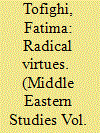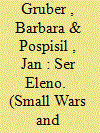| Srl | Item |
| 1 |
ID:
183755


|
|
|
|
|
| Summary/Abstract |
Disillusioned by possibilities of political reform in an economically developing country, the Irani-an radicals of the 1960s and 70s adopted certain practices. These bodily techniques served both practical concerns and radical self-fashionings. That is, the guerrilla fighters had to familiarize themselves with mountains and forests, recruit members from the working class, and subsist on minimal means in communal houses. But they also would not succumb to the newly-emerging comprador bourgeois values that was, in their opinion, feeding imperialism. In this article I study those bodily practices in their global context, by reference to the practical and theoretical back-ground. It is interesting that while the paramilitary or theoretical aspects of these movements were not always appealing to the larger society, the bodily ethics could intrigue people from across the political or religious spectrum. The particular virtues of self-sacrifice, resilience, self-reliance, seriousness, among other things were cultivated by means of bodily practices. By these kinds of bodily resistance, Iranian radicals formed a subjectivity outside the dominant/dominated binary, where increasing political consciousness involved lifestyle changes on the most private surface.
|
|
|
|
|
|
|
|
|
|
|
|
|
|
|
|
| 2 |
ID:
139105


|
|
|
|
|
| Summary/Abstract |
In conflict studies, identity has been posited as an explanatory factor of the resilience of insurgencies. This article focuses on the identity formation of the National Liberation Army (ELN), a leftist insurgency group in Colombia. As a Marxist–Leninist organisation, the ELN aims to overcome capitalism. In their perception, this is possible via the transformation of the individual into a ‘collective personality’. Along the dimensions of ‘content’ and ‘contestation’, we will demonstrate the mechanisms they impose for such identity formation. Identity, as we will argue, is a main factor in explaining why people participate in this insurgency and thereby enhance its resilience.
|
|
|
|
|
|
|
|
|
|
|
|
|
|
|
|